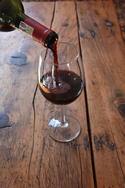Stay in the Vino
Do you know what’s great? Wine. Do you know what is even greater than wine (the correct answer to this question is ‘free wine’)? These vino facts, all ten of them, below.

Fact number 1
In the Early Republic of ancient Rome, women were denied the pleasure of consuming wine. If the woman who decided to indulge in an illegal tipple of wine had the misfortune of being married to a stickler of the law, her husband would have the right to have her severely punished.
Fact number 2
Still in ancient Rome, the practice of toasting began when the Senate (a political assembly of society’s wisest and most experienced men who were appointed to the senate by consuls) decreed that Augustus, the first Roman emperor should be honoured with a toast at the beginning of every meal. This practice took root with the ‘tostus’, which was a piece or crumbs of burnt toast added to a glass of wine to reduce the wine’s surplus acidity. Once this was done everyone would raise their glasses to the emperor or honoured guest, which is how the practice of toasting came about.
Fact number 3
The number of customs and beliefs related to the consumption of wine which originates from Ancient Roman times shed light on the combination of paranoia and hedonism that characterised this era. One of these is the concern of guests that their host might have murderous intent. In order to assuage his guests’ fears regarding this, the host would drink the first glass or cup of wine to show that he was indeed not poisoning them.
Fact number 4
Contrary to the traditional belief that wine improves with age, winemaking trends have changed and today wines are made for more rapid consumption. Current wine experts hold that almost 98% of wine should be consumed sooner rather than later. In effect, this means that wine should be consumed within the year of its production and at a push, within 3 to 5 years.
Fact number 5
Wine is not made from the grapes we eat as fruit. The grapes that we consume in their original form are known as table grapes, while the grapes used to make wine are indeed called wine grapes. Wine grapes are generally smaller, more thin-skinned and fragile than table grapes, which are larger and sturdier, bred to withstand harvesting, packaging and transportation to store shelves for purchase by consumers. Though wine grapes are also delicious to eat when ripe, their skins and tannins create a different flavour profile versus the sweetness you may experience eating table grapes.
Fact number 6
If you are an individual who likes to play by the rules, then this fact should be of particular interest to you. The correct way to hold your wine glass depends on the type of wine glass you are holding. If you are enjoying a glass of white wine, then holding the glass by the stem is required. If you are having red wine, then holding wine glass around the bowl of the glass is correct grip as the heat from your hands will slowly increase the warmth of the wine.
Fact number 7
Recent studies have shown that women are naturally better at tasting wine than men. While this is probably not a popular finding amongst the traditional male winetasting fraternity, studies have proven that women have a more developed sense of taste and smell than men and women to be better at identifying a more diverse range of scents.
Fact number 8
To spit or to swallow? Wine tasting aficionados will advise you to hold the wine in your mouth for a moment and then promptly liberate it into a spittoon. This is the wine purist way. Many believe one of the features of a superior wine is its extended aftertaste, while that of a lesser wine will have a shorter aftertaste.
Fact number 9
For many, the only fear concerning wine is not having any to serve when guests arrive unexpectedly. There is however another fear to consider here, and that is the fear of wine itself. This fear is called oenophobia and it is extremely rare amongst wine lovers.
Fact number 10
To end this list of facts on a whimsical note, if you love all things wine related, in Japan you take a break and buy a wine flavoured Kit Kat. This unusual Japanese creation was the brainchild of Nestlé.